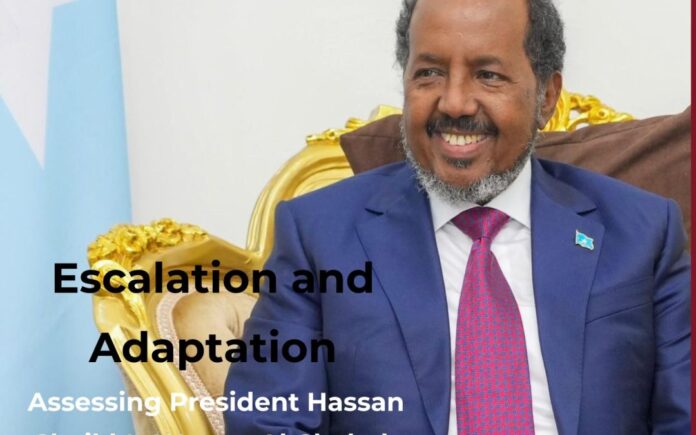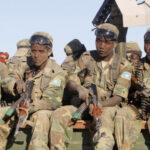A report released by the Hiraal Institute, a renowned Somali think tank, has shed light on the deteriorating security situation in Somalia during President Hassan Sheikh Mohamud’s tenure from May 2022 to May 2024.
The comprehensive analysis exposes the growing threat posed by Al-Shabab, the shortcomings of allied operations, and the political and leadership missteps that have contributed to the country’s instability.
Al-Shabab’s Expanding Offensive
The Hiraal Institute’s report reveals a worrying trend in the escalation of Al-Shabab’s attacks over the past two years. The data indicates that the militant group has not only increased the frequency of its offensive operations but has also adopted more aggressive and destructive tactics, focusing on direct confrontations and the widespread use of improvised explosive devices (IEDs).
The report highlights a staggering 75% increase in the number of raids carried out by Al-Shabab, from an annual average of 280 in 2020-2021 to an alarming 490 in 2022-2023. Additionally, the use of IEDs has surged by 50%, with incidents rising from an average of 166.5 per year in 2020-2021 to 249.5 per year in 2022-2023.
These findings demonstrate Al-Shabab’s growing boldness and operational capabilities, presenting significant obstacles to the Somali government’s efforts to establish stability. The Hiraal Institute’s analysis suggests that the government’s nearly two-year offensive against the group has failed to significantly weaken its presence or disrupt its ability to carry out devastating attacks across the country.
Limitations of Allied Operations
The Hiraal Institute’s report also casts doubt on the effectiveness of allied operations in weakening Al-Shabab’s capabilities and diminishing its territorial control. Although the data indicates a modest increase in the frequency of airstrikes and special forces raids during President Mohamud’s tenure, the impact of these actions on the group’s overall strength and influence appears to be limited.
The report emphasizes Al-Shabab’s impressive adaptability in the face of counter-insurgency measures, enabling the group to maintain its operational cohesion and resilience despite increased pressure from allied forces. This observation suggests that the current security approach, which primarily relies on military interventions, is inadequate in tackling the multifaceted challenges posed by the militant group.
Furthermore, the Hiraal Institute’s analysis exposes the unintended consequences of the government’s strategy of arming clan militias, known as Macawisley, to counter Al-Shabab. The report reveals a shocking 163% increase in clan infighting incidents, from 41 in 2020 to 108 in 2023, highlighting the dangers associated with this approach and its detrimental impact on the country’s security landscape.
Leadership Shortcomings and Political Missteps
The Hiraal Institute’s report also delves into the political and leadership failures that have undermined Somalia’s stability and impeded effective efforts to combat Al-Shabab. The report strongly criticizes President Mohamud’s mismanagement of the constitutional amendment process, which has exacerbated political divisions and strained relationships with key regional stakeholders, notably Puntland.
The report contends that the President’s lack of genuine engagement in dialogue and consensus-building regarding the constitutional reform process has shifted focus and resources away from the urgent security and economic challenges confronting the nation. Moreover, the deterioration of Somalia’s ties with crucial regional allies, such as Ethiopia and the United Arab Emirates (UAE), has had significant ramifications for regional security cooperation and the country’s capacity to effectively fight Al-Shabab.
The Hiraal Institute’s analysis also underscores the pervasive corruption and mismanagement within the security forces, which have undermined the efficacy of counter-insurgency efforts and eroded public confidence in the government’s ability to ensure security. The report points to the high prevalence of “ghost soldiers” and the misappropriation of resources as indicators of the systemic issues afflicting the security apparatus.
A Call for a Comprehensive Approach
The Hiraal Institute’s report serves as a grave warning about the escalating threat posed by Al-Shabab and the inadequacies of the current security approach in Somalia. The findings underscore the pressing need for a holistic and flexible strategy that extends beyond military interventions and addresses the underlying political, social, and economic drivers of the conflict.
The report urges greater transparency, accountability, and inclusivity in the government’s decision-making processes, as well as a sincere commitment to engaging in dialogue and reconciliation with marginalized communities and political opponents. It also stresses the importance of strengthening regional cooperation and partnerships to confront the shared security challenges facing the Horn of Africa.
As Somalia continues to navigate the complex challenges posed by Al-Shabab and the shortcomings of its current security approach, the Hiraal Institute’s report provides valuable insights for policymakers, researchers, and stakeholders seeking to comprehend the intricacies of the conflict and formulate more effective strategies for fostering lasting peace and stability in the country.





